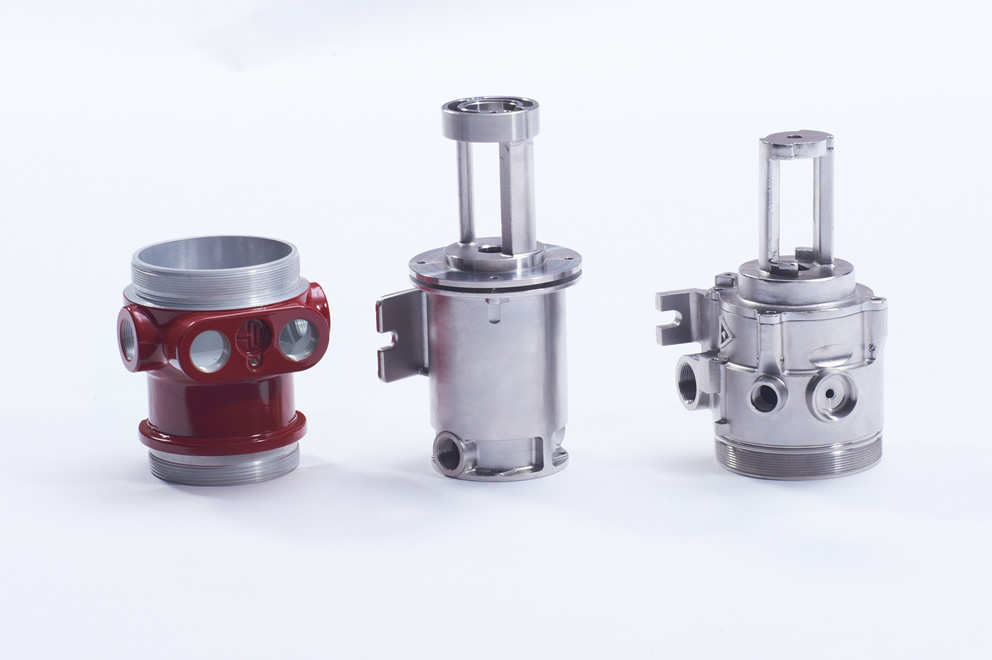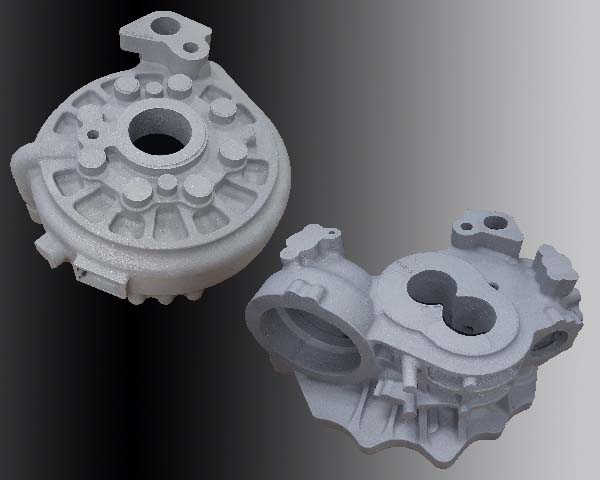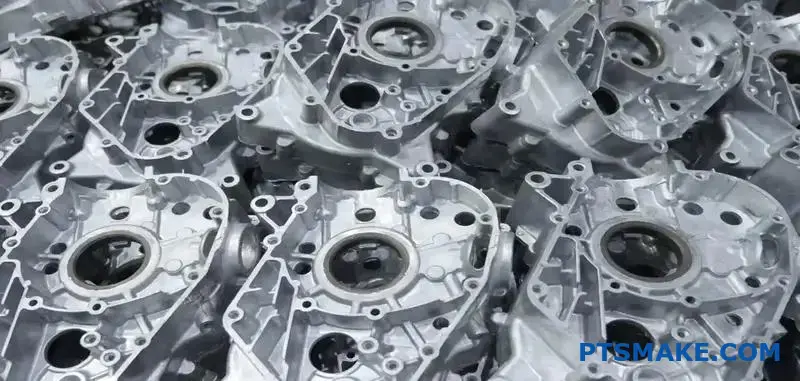Checking Out the Cutting-edge Processes Behind Modern Light Weight Aluminum Factory Workflow
Modern light weight aluminum shop procedures are undergoing substantial improvement. Automation and AI are reshaping manufacturing techniques, enhancing both performance and accuracy. The combination of 3D printing is improving mold production, while sustainability practices are coming to be extra important. Each of these innovations plays a crucial role in redefining the market. Nevertheless, the implications of these modifications prolong beyond mere production efficiency. What opportunities and obstacles lie ahead for aluminum factories in this evolving landscape?
The Function of Automation in Light Weight Aluminum Foundries

Additionally, automation contributes to enhanced safety and security criteria within the shop setting. By moving harmful tasks to equipments, human workers can concentrate on managerial roles and high quality control, lessening the risk of crashes. In addition, information analytics obtained from automated procedures offer valuable understandings right into functional efficiency, resulting in far better decision-making and constant enhancement. As the demand for light weight aluminum products grows, the fostering of automation modern technologies will likely increase, better changing the landscape of aluminum foundry procedures.
Improvements in Spreading Technologies
Current developments in casting technologies are changing aluminum factory procedures. Innovations such as 3D printing assimilation, advanced alloy formulas, and automated procedure optimization are boosting efficiency and item top quality. These growths are pivotal in satisfying the evolving demands of the sector.
3D Printing Integration
Incorporating 3D printing technology into aluminum shop operations has changed typical spreading approaches, enhancing both efficiency and accuracy. This ingenious strategy allows for the fast manufacturing of complex molds and cores, considerably reducing lead times and material waste. By making use of additive manufacturing, foundries can create complex geometries that were formerly challenging or impossible to attain with conventional methods. The adaptability of 3D printing additionally enables fast style adjustments, promoting a more nimble manufacturing procedure. On top of that, this assimilation sustains using lightweight structures, which is progressively vital in sectors such as auto and aerospace. As aluminum shops proceed to take on 3D printing, they place themselves at the center of technological advancement, driving renovations in item quality and operational abilities.
Advanced Alloy Formulations
The development of advanced alloy formulas has actually considerably boosted spreading modern technologies in light weight aluminum factory operations. These formulas integrate numerous components, such as copper, magnesium, and silicon, to boost mechanical residential or commercial properties and thermal resistance. By customizing the structure of light weight aluminum alloys, makers can achieve details efficiency characteristics that fulfill the needs of varied applications, from automobile components to aerospace frameworks. The usage of advanced alloys additionally adds to reduced weight and raised stamina, which are crucial factors in contemporary design. Furthermore, technologies in alloy growth allow far better fluidity throughout spreading, leading to enhanced surface area coatings and decreased problems. Generally, progressed alloy solutions represent a considerable jump forward, positioning aluminum factories to fulfill the evolving requirements of numerous industries effectively.
Automated Process Optimization
Innovations in casting innovations have paved the means for automatic procedure improvement in light weight aluminum foundry operations. By incorporating innovative software application and real-time data analytics, shops can now improve manufacturing procedures and boost top quality control. Automated systems keep track of variables such as air conditioning, temperature, and stress prices, enabling prompt modifications that reduce issues and waste. Additionally, machine learning formulas analyze historical performance data to predict optimal settings, thereby boosting efficiency and reducing cycle times. Robotics additionally play a significant role, handling recurring jobs that enhance safety and accuracy. Overall, these developments not only drive functional performance however also make it possible for factories to satisfy the growing demand for high-quality light weight aluminum parts in various markets.
Smart Manufacturing and Industry 4.0 Assimilation
The assimilation of Smart Production and Market 4.0 within light weight aluminum foundries is changing functional efficiency. By leveraging IoT technologies, automation, and robotics, shops can maximize production procedures and minimize downtime. Additionally, information analytics supplies crucial insights that boost decision-making and drive continual enhancement.
IoT in Foundry Procedures
As producers increasingly accept the Internet of Things (IoT), factory procedures are experiencing a transformative change in the direction of smart production and Industry 4.0 assimilation. Aluminum Foundry. IoT technologies make it possible for real-time information collection and analysis, improving decision-making processes and functional performance. Sensors and linked Web Site tools keep an eye on equipment performance, material use, and environmental problems, allowing for positive maintenance and resource optimization. This connection fosters a much more active manufacturing atmosphere, where adjustments can be made promptly in action to market demands. In addition, IoT assists in boosted traceability and quality assurance, as data from the whole manufacturing cycle can be easily accessed and evaluated. Overall, the combination of IoT in shop procedures significantly enhances efficiency and drives technology in aluminum manufacturing procedures
Automation and Robotics Integration
Automation and robotics assimilation is revolutionizing aluminum foundry operations by improving effectiveness and precision. This transformative method streamlines processes such as molding, pouring, and ending up, reducing human mistake and increasing result uniformity. By employing sophisticated robotic systems, shops can accomplish greater production prices while preserving rigid quality standards. Automated systems likewise allow real-time tracking and adaptive control, permitting speedy changes to manufacturing parameters. On top of that, the assimilation of robotics reduces labor prices and alleviates security risks connected with hands-on handling of molten steel. As shops embrace smart production concepts intrinsic in Market 4.0, visit this site right here the synergy between automation and robotics strengthens their one-upmanship, leading the way for lasting development and advancement in the light weight aluminum casting market.
Information Analytics for Effectiveness
Taking advantage of data analytics greatly boosts effectiveness within light weight aluminum shop operations, lining up with smart manufacturing and Sector 4.0 principles. By leveraging real-time information collection and analysis, factories can check production procedures, forecast tools failings, and enhance resource allowance. This data-driven approach assists in informative decision-making, enabling managers to recognize bottlenecks and boost process. Additionally, predictive analytics equips factories to anticipate market needs, thus reducing waste and guaranteeing timely product shipment. Integration of information analytics with IoT tools improves operational visibility, promoting a positive upkeep culture. Eventually, implementing these sophisticated analytical methods not only enhances performance but additionally drives advancement, positioning light weight aluminum factories to fulfill the evolving needs of the sector while keeping one-upmanships in a quickly changing landscape.
Lasting Practices in Light Weight Aluminum Casting
While the light weight aluminum spreading market has actually generally encountered environmental difficulties, lots of shops are now adopting sustainable methods to minimize their influence (Aluminum Foundry). A considerable emphasis has been on reusing light weight aluminum scrap, which not only decreases waste however likewise saves energy compared to primary click here now light weight aluminum production. Cutting-edge melting technologies, such as induction heaters, boost power efficiency and lower greenhouse gas discharges
In addition, factories are carrying out closed-loop water systems to decrease water usage and reduce thermal air pollution. Using environment-friendly binders in mold-making processes is gaining traction, more reducing harmful discharges.
Some centers are investing in renewable power sources to power procedures, lining up with global sustainability objectives. By integrating these techniques, the light weight aluminum spreading industry is developing toward an extra ecologically responsible future, showing that economic growth can exist side-by-side with environmental stewardship - Aluminum Casting Company. These efforts show a dedication to sustainability and the significance of environmental accountability in manufacturing
High Quality Control Innovations
As the light weight aluminum casting industry advancements in the direction of sustainability, the importance of quality assurance advancements ends up being significantly evident. Modern aluminum factories are taking on advanced modern technologies to improve their quality control procedures. Strategies such as real-time tracking and data analytics permit producers to detect variances and defects early in the manufacturing cycle. Applying automated inspection systems furnished with equipment finding out formulas warranties that items fulfill rigorous high quality requirements while lessening human error.
The combination of non-destructive testing approaches, such as ultrasonic and radiographic inspections, provides much deeper understandings into the integrity of castings without damaging the material. These advancements not only boost item dependability but likewise minimize waste, aligning with sustainability objectives. In enhancement, the fostering of standardized quality frameworks assists improve procedures throughout various foundries, ensuring consistency in result. Jointly, these innovations are improving quality assurance, fostering a culture of excellence within the light weight aluminum spreading industry.
Future Trends in Light Weight Aluminum Shop Procedures
What technologies lie in advance for aluminum shop operations? The future of light weight aluminum factories is poised for makeover with developments in automation, man-made intelligence, and lasting techniques. The integration of robotics and automated systems is anticipated to improve efficiency and precision in the casting procedures, reducing human mistake and labor costs. In addition, AI-driven analytics will enable real-time surveillance and anticipating maintenance, enhancing operational efficiency and lessening downtime.
Sustainability remains a prime focus, with shops progressively taking on environmentally friendly methods, such as utilizing recycled light weight aluminum and creating low-emission melting technologies. Developments in 3D printing are additionally expected to revolutionize mold-making, permitting complicated geometries and reduced product waste. As the sector embraces digitalization, data-driven decision-making will certainly end up being essential, enabling factories to react swiftly to market needs. Jointly, these trends guarantee to redefine aluminum foundry procedures, making them more reliable, lasting, and versatile to future challenges.

Frequently Asked Questions
What Precaution Are Executed in Aluminum Foundry Operations?
Light weight aluminum factory operations implement numerous safety steps, consisting of personal safety equipment, air flow systems to take care of fumes, routine safety training, emergency situation reaction strategies, and stringent surveillance of temperature level and tools to stop crashes and warranty employee safety and security.
Just How Do Factories Handle Workforce Training for New Technologies?

What Products Are Typically Recycled in Light Weight Aluminum Foundries?
Light weight aluminum shops typically recycle scrap aluminum, including post-consumer items like beverage canisters, automobile components, and building products. This reusing procedure decreases waste and saves resources, adding to a more lasting aluminum production industry.
Just How Does Light Weight Aluminum Spreading Influence the Setting?
Light weight aluminum casting influences the environment through energy-intensive procedures, greenhouse gas exhausts, and potential regional contamination. Advancements in reusing and sustainable practices can alleviate these results, promoting a more green method to aluminum production.
What Are the Normal Lead Times for Light Weight Aluminum Spreading Projects?
Normal lead times for light weight aluminum casting projects vary considerably, typically varying from 2 to 6 weeks. Factors influencing these timelines include complexity, order dimension, and material schedule, impacting total manufacturing schedules in foundry operations.
Automation significantly plays an essential function in light weight aluminum foundries, enhancing efficiency and accuracy in the manufacturing process. Innovations in casting innovations have actually led the way for computerized process enhancement in aluminum factory procedures. Using information analytics greatly enhances effectiveness within light weight aluminum factory procedures, lining up with clever manufacturing and Industry 4.0 principles. A significant emphasis has been on recycling aluminum scrap, which not only decreases waste but additionally saves power compared to key light weight aluminum manufacturing. Light weight aluminum foundries commonly reuse scrap aluminum, including post-consumer products like beverage canisters, automotive parts, and building and construction materials.